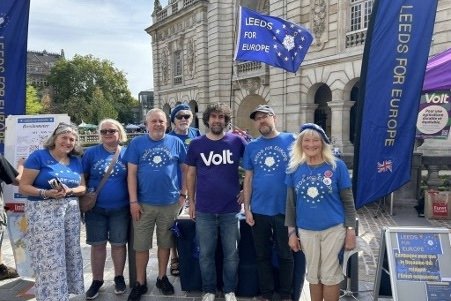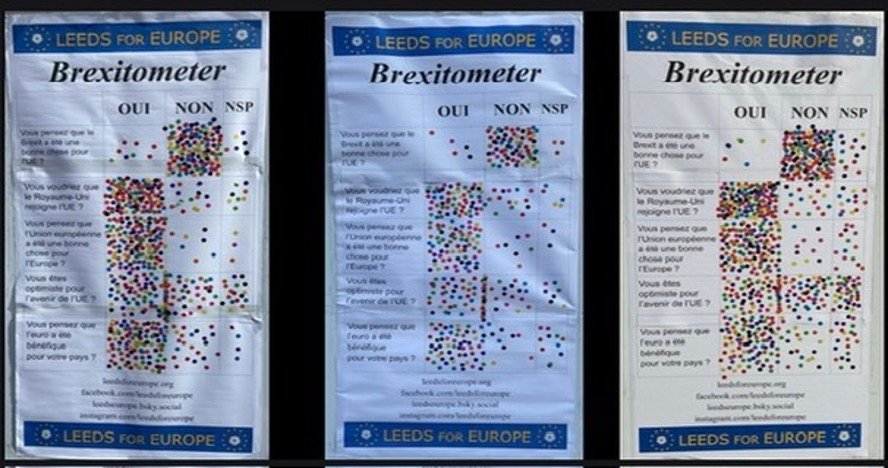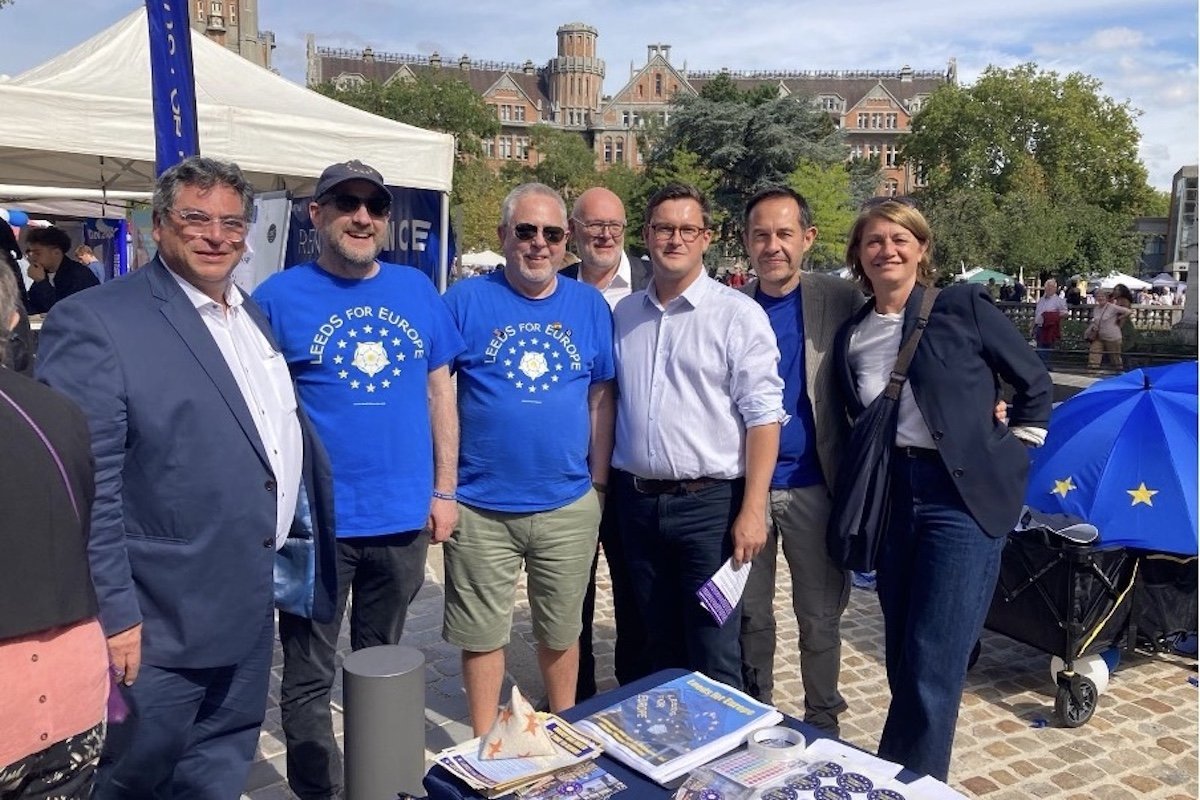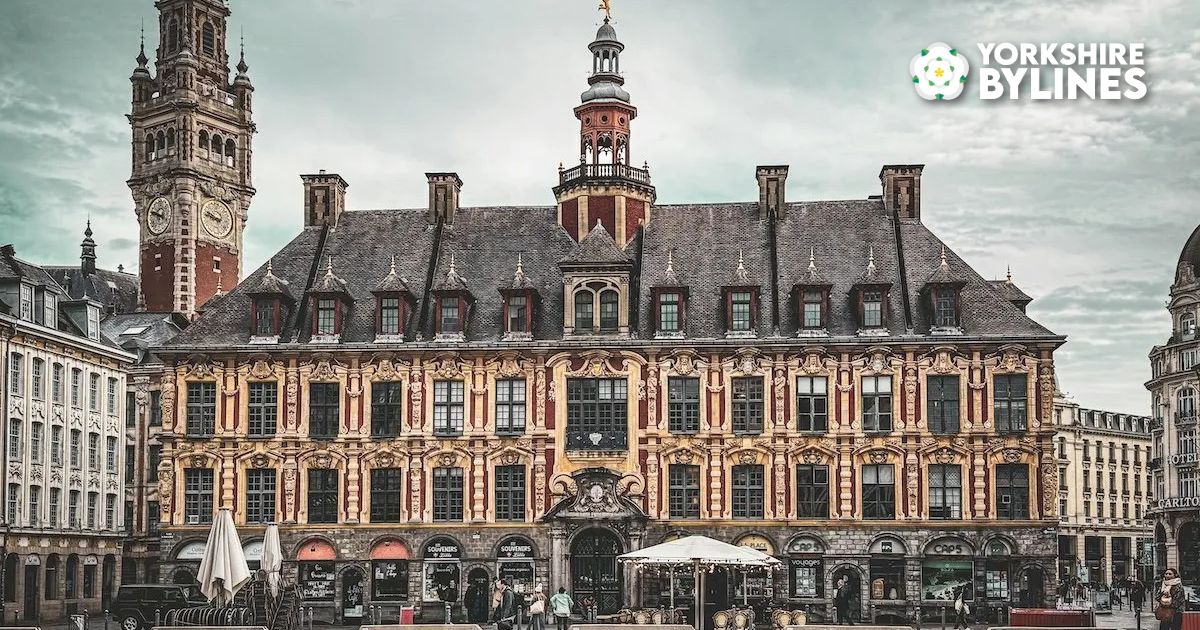Two years ago, Leeds for Europe visited Leeds’ twin city, Lille, to take part in the Braderie de Lille with a street stall. For the first weekend of September 2025, we returned to ask Europeans, not just from France but from all over northern Europe, about their views on Brexit, the European Union and how they see the future. We were particularly interested to see what, if anything, had changed in the last couple of years.
 The Leeds for Europe team with Volt’s Sven FrankThe Braderie de Lille
The Leeds for Europe team with Volt’s Sven FrankThe Braderie de Lille
For those not familiar with the event, on the first weekend in September, the city of Lille in Northern France closes 5,000km of its roads and turns the city centre into the largest street market in Europe. The stalls range from antique dealers to the junk from somebody’s attic laid out in front of their apartment. In recent years it has become more of a festival with music, dancing exhibitions and more.
The Porte de Paris area of the city, in front of the impressive city council buildings, is set aside for political associations such as political parties, trade unions and other groups, for them to promote their message and ideas to visitors to the Braderie. That is where we held our two-day street stall.
On arrival at the Porte de Paris on Saturday morning, we saw our first difference from 2023. The Porte is now fully pedestrianised and landscaped, and looked rather splendid.
A good location for the Brexitometer
We located our ‘pitch’ and found ourselves between Volt France, who had helped us with the arrangements, and President Macron’s Rennaissance Party – which would prove interesting over the weekend. The first thing we noticed was that the atmosphere seemed more vibrant, more immediate, amongst the political stall holders than it had in 2023. Our friends from Volt told us this was because the French government was expected to fall on the Monday, which it subsequently did. This added a sense of urgency amongst the stall holders.
On all our street stalls we have our Brexitometer (we now call it our Euromonitor when in Leeds): a flipchart with five questions to get people’s opinions and encourage discussion. A proven strategy, which we followed in Lille. Our five questions were:
- Was Brexit good for Europe?
- Would you welcome the UK back into the EU?
- Do you think the EU has been good for Europe?
- Do you feel positive about the future of the EU?
- Do think the Euro has been good for your country?

The Brexitometer was so popular that we needed two on Saturday.
UK welcomed, but concerns for EU future
In terms of results, we were delighted to find that the vast majority of those who engaged with us, still think Brexit was bad for Europe, and that they would welcome the UK back into the European Union. The obvious caveat was that we should become full, committed members, accepting the Euro and being part of Schengen, and with no special rebates or exceptions. We were happy to confirm that as also being our vision of the UK’s future membership. It was also felt that the Euro was a good thing.
The surprise was the number of people who are not optimistic about the future of the EU. Several people we spoke to cited the rise of the far right and figures like Hungary’s Orban, Meloni in Italy, the AfD in Germany, and even Nigel Farage. They were concerned about the effect they could have on the EU, and we felt it also reflected the current uncertainty in France.
French political parties split the left vote
Interestingly, nobody mentioned Marine Le Pen and her party, Rassemblement National (or National Rally) who did not have a stall at the Braderie. Although they were absent, it is difficult to see how the National Rally party can be stopped in France, based on the number of different parties on the left represented at the Braderie. From the far-left populist, Jean-Luc Melenchon to the traditional Young Communists, all seemed to dislike each other intensely. Real ‘Popular People’s Front of Judea’ and ‘People’s Popular Front of Judea’ stuff.
Macron’s Rennaissance Party seemed to be very unpopular, with people stopping at their stall to shout insults and express anger. One of our group compared it with the reaction of Brexiters to our street stalls back in 2019. Rennaissance did not turn up for the second day.
Meeting the local dignitaries
As well as meeting and talking to ordinary Europeans, we were delighted to be visited by Lille Mayor Arnaud Deslandes and some of his deputies, and we were made very welcome by Alexandra Mahe, the Director of International Affairs, Ville de Lille.
 With Mayor Arnaud Dellandes (in white shirt) and some of his deputies
With Mayor Arnaud Dellandes (in white shirt) and some of his deputies
It was also great to see Stéphane Baly again, who we first met in 2023. Baly is the Green Party candidate for Lille Mayor in March, and is confident of winning. He introduced us to Marine Tondelier, leader of the Green Party in France, and Green MEP, Mélissa Camara.
All in all, it was a great experience to take part in the Braderie again. Wonderful to speak to people who do not regard membership of the EU as impinging on their sovereignty (whatever that is). And it was great to see the Lille City Council buildings proudly flying two giant drapeaux tricolore alongside two giant EU flags.
Anti-Brexit, pro-EU, pro-UK membership
Yes, we spoke to one or two who did not like the EU: the word “merde” was used, and one other told us that the EU was led by Nazis and, in the next breath, led by Soviets, but the vast majority support the EU, even if they are concerned about the future. We can also report that “they” don’t hate us in France; they think Brexit was bad for Europe and they would welcome the UK back into the European fold.
